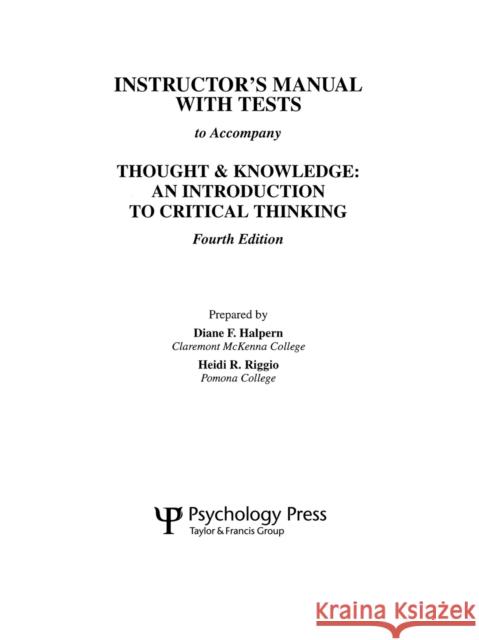Thought and Knowledge: An Introduction to Critical Thinking » książka
Thought and Knowledge: An Introduction to Critical Thinking
ISBN-13: 9780805845495 / Angielski / Miękka / 2002 / 315 str.
This best-selling textbook, written by award-winning educator and past president of the APA, Diane Halpern, applies theory and research from the learning sciences to teach students the thinking skills they need to succeed in today's world. This new edition retains features from earlier editions that have helped its readers become better thinkers. A rigorous academic grounding based in cognitive psychology is presented in a clear writing style with a humorous tone and supported by numerous practical examples and anecdotes.
Thought & Knowledge, Fourth Edition has been revised to help students meet the challenges of a global neighborhood and make meaningful conclusions form the overwhelming quantity of information now available at the click of a mouse. The skills learned with this text will help students learn more efficiently, research more productively, and present logical, informed arguments.
New features include:
*Template for Making Arguments. This is a crucial preparation tool for students in any subject area. For those planning on continuing to Graduate School, this feature is an essential reference. The Graduate Record Examination (GRE) now requires that all test takers write an argument on a contemporary topic.
*Concept Maps provide students with strategies to clarify complex information and retain long-term knowledge.
*Contemporary Examples, throughout the text, relate current events to the book discussions.
*Explanations on How to Evaluate Information found on Web sites.
*Revised Student Workbook. Thinking Critically About Critical Thinking, Fourth Edition is filled with new exercises to reinforce learning and practice newly acquired skills. This workbook can be purchased in a student package with the text or as a separate item.
Thought & Knowledge, Fourth Edition is appropriate for use as a textbook in critical thinking courses offered in departments of psychology, philosophy, English, humanities, or as a supplement in any course where critical thinking is emphasized.











